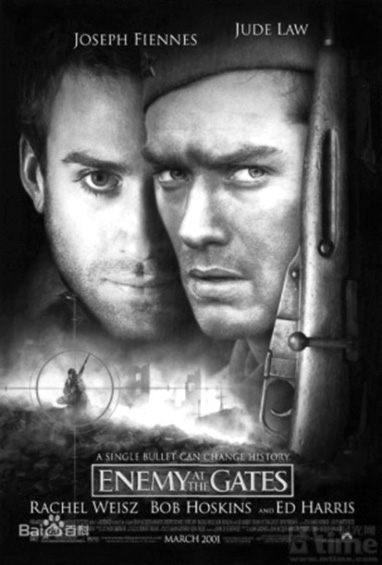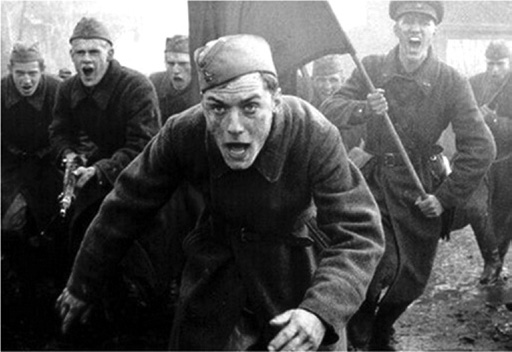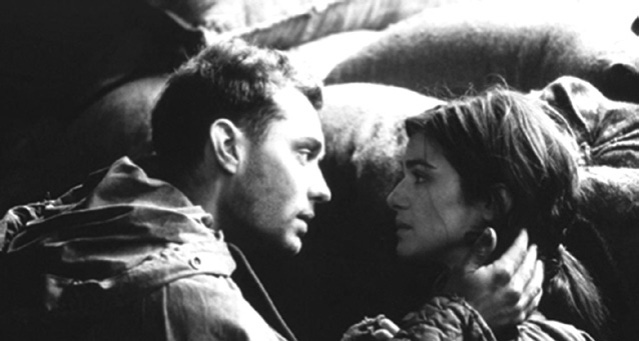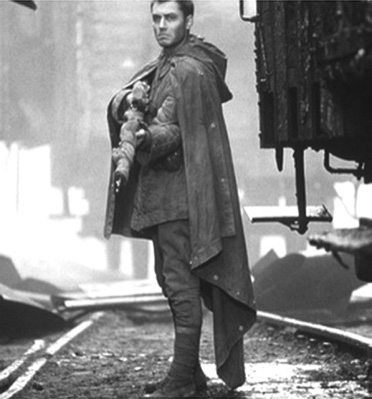




千军万马,枪林弹雨,两大神枪手展开一场生死较量……
《兵临城下》( Enemy at the Gates )于2001年7月放映,是让·雅克·阿诺(Jean Jacques Annaud)导演的一部关于二次大战的电影。该片获2001年欧洲电影奖最佳导演、最佳女主角和最佳男主角提名。
影片讲述了传奇狙击手瓦西里·扎伊采夫(Vassili Zaitsev)在斯大林格勒战役中的出色战绩。德苏两军对峙,双方士兵互相厮杀、尸横遍野。瓦西里凭借神准枪法,歼敌无数。于是德军派出他们最顶尖的神枪手康尼少校(Major Knig)和他一决高下。面对强敌,瓦西里会有怎样的表现?

K = Khrushchev(赫鲁晓夫)
O1 = Officer 1(军官1)
O2 = Officer 2(军官2)
D = Danilov(丹尼洛夫)

K: My name is Nikita Sergeyevich Khrushchev. I ’ ve come to take things in hand here. This city is not Kursk, nor is it Kiev, nor Minsk. This city is Stalingrad. Stalingrad ! This city bears the name of the boss ① . It’s more than a city, it’s a symbol. If the Germans capture this city, the entire country will collapse . Now, I want our boys to raise their heads. I want them to act like they have balls! I want them to stop shitting their pants! That’s your job. As political officers, I ’ m counting on you ② . You, what’s your suggestion?
O1: Shoot all the other generals who have retreated and their chiefs of staff too.
O2: M-Make some examples. D-D-Deport families of the deserters .
K: Yeah, that’s all been done.
D: Give them hope! Here, the men’s only choice is between German bullets and ours. But there ’ s another way. The way of courage. The way of love of the motherland. We must publish the army newspaper again. We must tell magnificent stories,stories that extol sacrifice , bravery. We must make them believe in the victory ③ . We must give them hope, pride, a desire to fight. Yes, we need to make examples, but examples to follow. What we need are heroes.
K: Do you know any heroes around here?
D: Yes, comrade, I know one.
K:我叫尼基塔·谢尔盖耶维奇·赫鲁晓夫,我来接管这里。这座城市不是库尔斯克,不是基辅,也不是明斯克,这个城市是斯大林格勒。斯大林格勒!这个城市是以我们领袖的名字命名的。它不仅是城市,更是一个标志。如果德国人占领了这座城市,整个国家就会瓦解。现在,我要我们的小伙子们抬起他们的头!我要他们像个爷们一样行动起来!我要他们不再吓得屁滚尿流!那才是你们的工作。作为政治军官,我指望你们。你,有什么建议?
O1: 枪毙所有临阵脱逃的将军和他们的参谋。
O2: 杀,杀一儆百,放,放逐逃兵的家属。
K:是的,这些已经做过了。
D:给他们希望!在这里,士兵不是被德军击毙就是被自己人误伤。但是,还有一条路,一条勇气之路,一条爱国之路。我们必须改变我们的军事报道。我们必须讲述感动人心的故事,歌颂勇于牺牲和充满勇气的故事。我们必须让他们坚信胜利。我们必须给予他们希望,自豪和战斗的欲望。是的,我们需要树立榜样,可以学习的榜样,我们需要英雄。
K:你认识什么英雄吗?
D:是的,同志,我知道一个。
1. I’ve come to take things in hand here.
take something/someone in hand表示“取得控制权,控制”,相当于assume control of something/someone。如Once the new teacher takes students in hand, this class will do much better. 一旦新老师掌控了学生,这个班上课的情况就会好很多。
1. This city bears the name of the boss.
bear作动词,意思是“具有某种特性”。Boss在这里指“斯大林”。bear the name of表示“具有……的名称,以……命名”。如The Swiss city that also bears the name of a lake is Geneva. 瑞士一个以湖泊名称命名的城市是日内瓦。
2. As political officers, I’m counting on you.
count on意思是“指望,依靠”,可用“to rely on;depend on”替换。如You can count on my help. 你可以依靠我的帮助。
3. We must make them believe in the victory.
make somebody do表示“让某人做某事”;make somebody doing表示“让某人一直做某事(强调动作的持续性)”。此句表示丹尼洛夫想让人们拥有必胜的信念。
take sth/ sb. in hand 取得控制权,控制
collapse vi. 崩溃;瓦解
deserter n. 逃兵
extol vt. 颂扬;赞美
sacrifice n. 牺牲
1. This city is Stalingrad!
赫鲁晓夫重读“Stalingrad”(斯大林格勒),以显示这座城市的重要性。
2. the useless Vassili
the位于元音前读[ði],在辅音前读[ðə],区别元音和辅音要根据单词的第一个音素,而不是单词的第一个字母。如useless第一个音素是半元音[j],因此the读[ðə]。类似的还有the other,the army。
3. shoot all连读为[ʃuːtɔːl]。类似的还有chiefs of [tʃiːfsəv]。
V = Vassili(瓦西里)
T = Tania(塔妮娅)

V: All these people here know they’re gonna die. So each night when they make it back, it’s a bonus.
T: Excuse me.
V: So, every cup of tea, every cigarette becomes a little celebration. Because for a lot of us, it maybe our last night. It’s just something you have to accept here. Everyone has their time. In the forest, the wolf lives for three years, the donkey for nine.
T: So, that’s, that’s got to be a proverb from the Urals. It makes no sense to me whatsoever.
V: The donkey lives longer because he’s more useful. Makes absolute sense.
T: There aren’t any donkeys in the forest. You made it up ① . So... I’m a donkey ② ?
V: People like you and Danilov have to survive this, people who have read books, had an education. We’ll need you when the war is over.
T: And if you survive, what will the useless Vassili Zaitsev do then?
V: I wanna work in a factory. My granddad took me to a factory once. There was this man there, high up on a, on a foot walk. He wasn’t wearing blue like the others. The people he was supervising didn’t understand what they were doing. But for him, for him up there, it was simple; it was clear. And I thought, “One day, I could be that man.” Sad to have a dream you know won’t happen ③ .
T: Why shouldn’t it? You’ll outlive us all. You’ll be the oldest donkey in the forest.
V:这里所有人都知道他们将会牺牲。所以,每天晚上能活着回来,就像中奖一样。
T:什么意思?
V:所以,每杯茶,每支香烟都是小小的庆祝。因为对我们大多数人来说,这可能是最后一晚。在这里,这是你必须接受的现实。每个人都有自己的命数。在森林里,狼能活三年,驴能活九年。
T:这是乌拉尔山区的一条谚语。无论如何对我都没有意义。
V:驴之所以活得长是因为它更有用。绝对有道理。
T:树林里根本就没有驴。你编出来的故事。那么,我是头驴吗?
V:你和丹尼洛夫这样的人必须要活下来。你们读过书,受过教育,当战争结束后,我们需要你们。
T:假如你能活下来呢?那么没什么用的瓦西里·扎特耶夫会做什么?
V:我想去工厂干活。我爷爷曾带我去过一次工厂。在那儿有个人,高高地站在门廊上。他不像其他人穿着蓝制服。他监管的人都不清楚自己在做什么。但他在那儿,高高在上,事情对他来说很简单,很清楚。于是我想:“有一天,我要成为那样的人。”最糟糕的就是你有梦想却不能实现。
T:什么不可能实现。你会比我们都活得更长。你会成为森林里最老的驴。
1. You made it up.
make up的意思是“编造,杜撰”。如I made up an excuse to explain my absence.我编了个理由来解释我缺席的原因。
2. So... I’m a donkey?
塔尼亚这样说是想向瓦西里求证,她会不会在这场战争中活得更长些。本段最后,塔尼亚安慰瓦西里时说他会成为森林里最老的驴,暗指他能在战争中生存下来。
3. Sad to have a dream you know won’t happen.
本句的完整形式为It is sad to have a dream that you know won’t hap-pen。形式主语it无实际语义,作句子逻辑主语,真正主语为动词不定式结构。
proverb n. 谚语,格言
make sense 说得通,符合逻辑,有道理
supervise vt. 监督,管理
outlive vt. 比……活得长
1. Because for a lot of us, it maybe our last night.
for与a相邻,连读时加入辅音[r],读作[fɔrəlɔtəvʌs]。类似的还有war is over连读为[wɔː rɪzəuvə]。
2. that’s got to be a proverb from the Urals.
got的[t]只做发音姿势,不发音,to的[t]发音。
3. And if you survive, what will the useless Vassili Zaitsev do then?
and弱读为[nd]。类似的Why shouldn’t it中,shouldn’t弱读,[t]不发音,读作['ʃudn]。
D = Danilov(丹尼洛夫)
V = Vassili(瓦西里)

D: Where is he? Where’s the major ?
V: A few inches from your face.
D: I’ve been such a fool, Vassili. Man will always be man. There is no new man. We tried so hard to create a society that was equal, where there’d be nothing to envy your neighbor. But there’s always something to envy. A smile, a friendship. Something you don’t have and want to appropriate ① . In this world, even a Soviet one, there will always be rich and poor. Rich in gifts, poor in gifts. Rich in love, poor in love. Tania isn’t coming back. She’s dead, Vassili. She was cut down by shrapnel ② . It was quick. I don’t think she even saw it coming. She was on her way back to you. As soon as she had seen Mrs. Filipov to the boats, she was coming back for you ③ . She was right. You’re a good man, Vassili. I want to help you, Vassili. Let me do one last thing. Something useful for a change. Let me show you where the major is.
V: Don’t do that. Don’t do that!
D:他在哪里?敌人的狙击手在哪里?
V:就在你面前几英尺远的地方。
D:我一直都很蠢,瓦西里。人类永远是人类,世上不会出现新人类。我们努力创造一个平等社会,在那里,你不用羡慕你的邻居。但是,总会有让人嫉妒的事存在。一个微笑,一份友谊,一些你没有却又想得到的东西。这个世界上,即使是苏维埃,也有富贫之分。富有天赋的人,毫无才华的人。拥有爱情的人,缺乏爱情的人。塔妮娅不会回来了,她死了,瓦西里。她被榴霰弹击中,发生的太快了,我想她甚至没看见弹片飞来。在她回来找你的路上。她一看见菲利波夫太太上船后,就马上回来找你。她是对的,你是个好男人,瓦西里。我想帮你,瓦西里。让我做最后一件事,做一件可以改变现状的事。让我来帮你找出敌人的位置。
V:别这么做,别这么做!
1. Something you don’t have and want to appropriate.
appropriate为动词,意思是“未经允许取得,利用或占有”,此句用appropriate表示“你没有的东西却想强行占有”。此处丹尼洛夫暗指他曾喜欢塔尼亚,想拥有她。如Tom appropriated dictionary and never returned it. 汤姆未经允许拿走我的词典就再也没还回来。
2. She was cut down by shrapnel.
cut down的意思是“被杀死,被击倒”。如The gunman cut down an innocent pedestrian. 枪手射杀了无辜的路人。
3. As soon as she had seen Mrs. Filipov to the boats, she was coming back for you.
as soon as的意思是“一……就……”。需注意as soon as引导的句子不能用进行式。如As soon as my parents got home, my brother stopped playing online games.父母一回家,我哥哥就不玩网络游戏了。
major n. 陆军少校
Soviet adj. 苏维埃的
shrapnel n. 弹片;榴霰弹
1. But there’s always something to envy.
to以元音[u]结尾,envy以元音[e]开头,连读时在[u]后加上一个辅音[w],发音为[tu(w)envi]。
2. Something you don’t have and want to appropriate.
want的[t]只做发音姿势,不发音,to的[t]发音。类似的还有and poor,cut down。
3. Rich in gifts, poor in gifts.
rich与in连读为[ritʃin]。类似的还有poor in gifts中,poor与in连读为[pɔːrin]。
4. I don’t think she even saw it coming.
she以元音[iː]结尾,even以元音[iː]开头,连读时在[iː]后加上一个辅音[y],发音为[ʃiː(y) iːvən]。
Vassili Zaitsev瓦西里·扎特耶夫(1915年3月23日-1991年12月15日),生于普里乌拉利耶,常跟父亲和哥哥进山打猎,12岁便练就了一手好枪法。作为二战时期苏军的狙击手,他在1942年斯大林格勒战役中,于11月10日至12月17日间共击毙敌军225名,其中包括11名狙击手,一战成名。
这部电影改编自作家威廉·克雷格(William Craig)1973年的同名纪实小说。故事发生在二战时的斯大林格勒战役。故事围绕两位神枪手——一位俄国牧羊人和一位德国军官之间的较量展开。